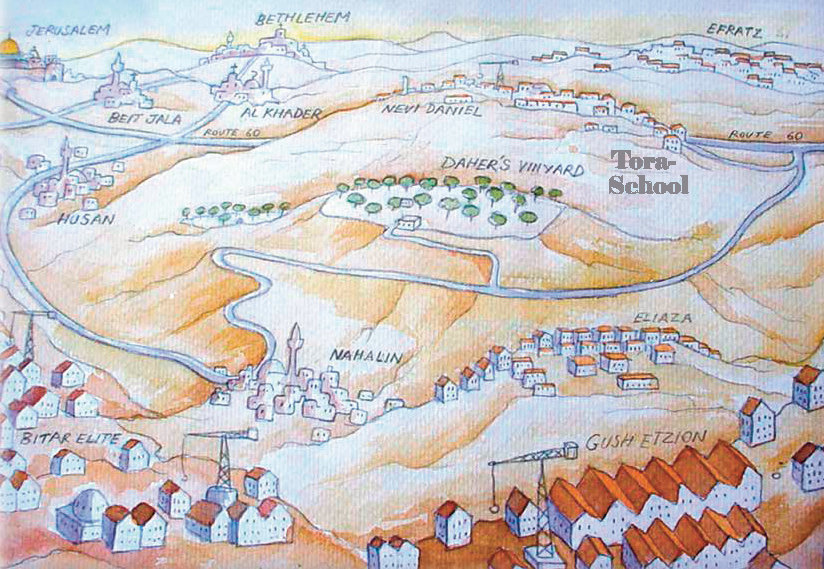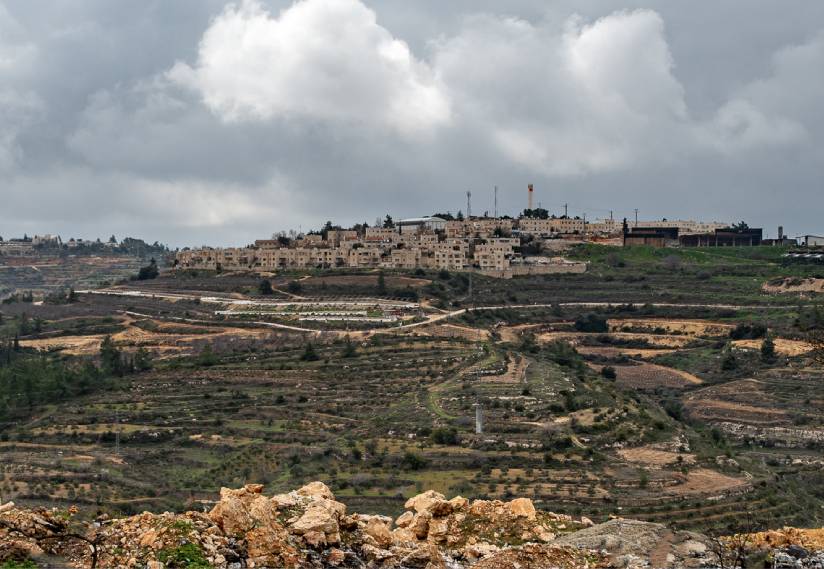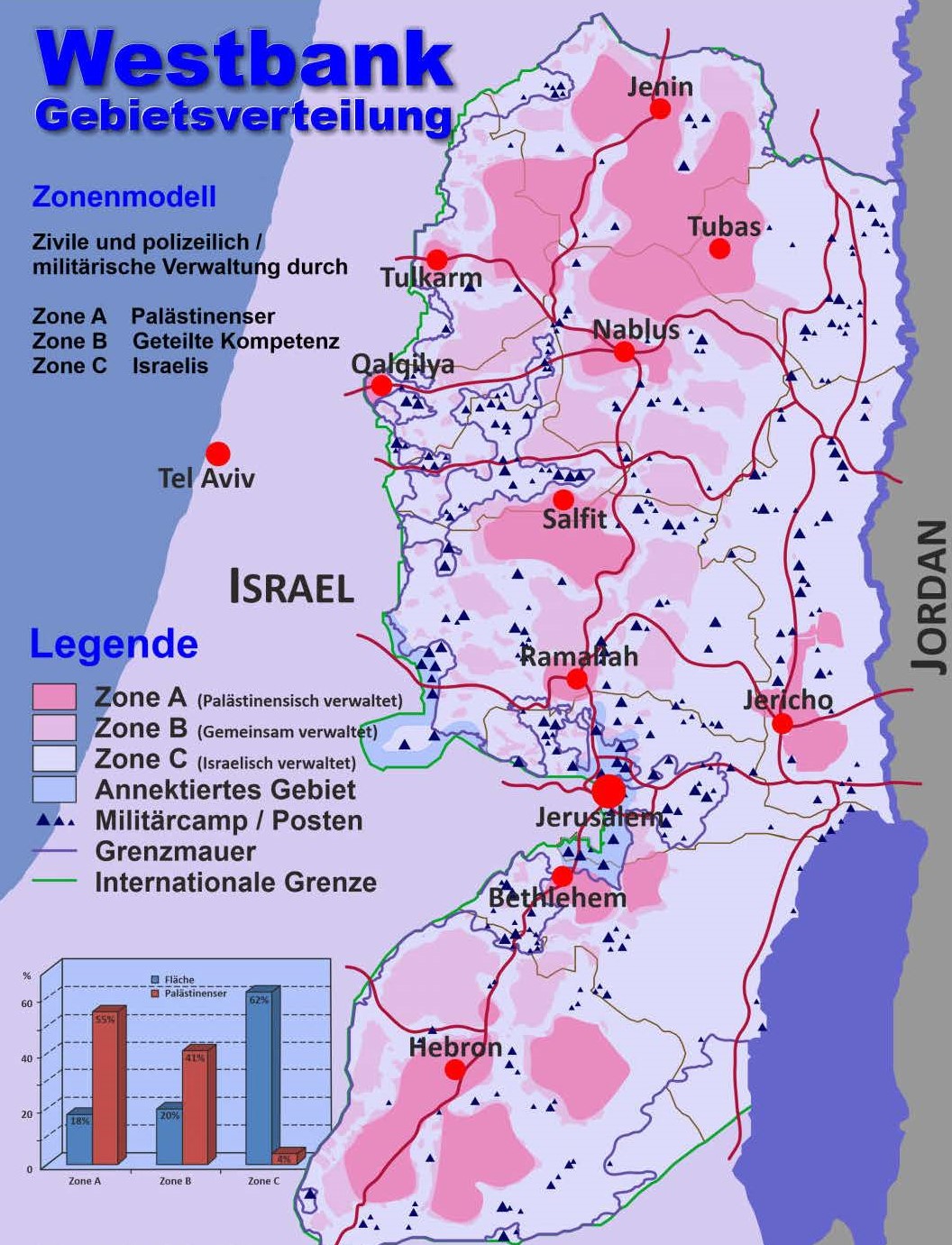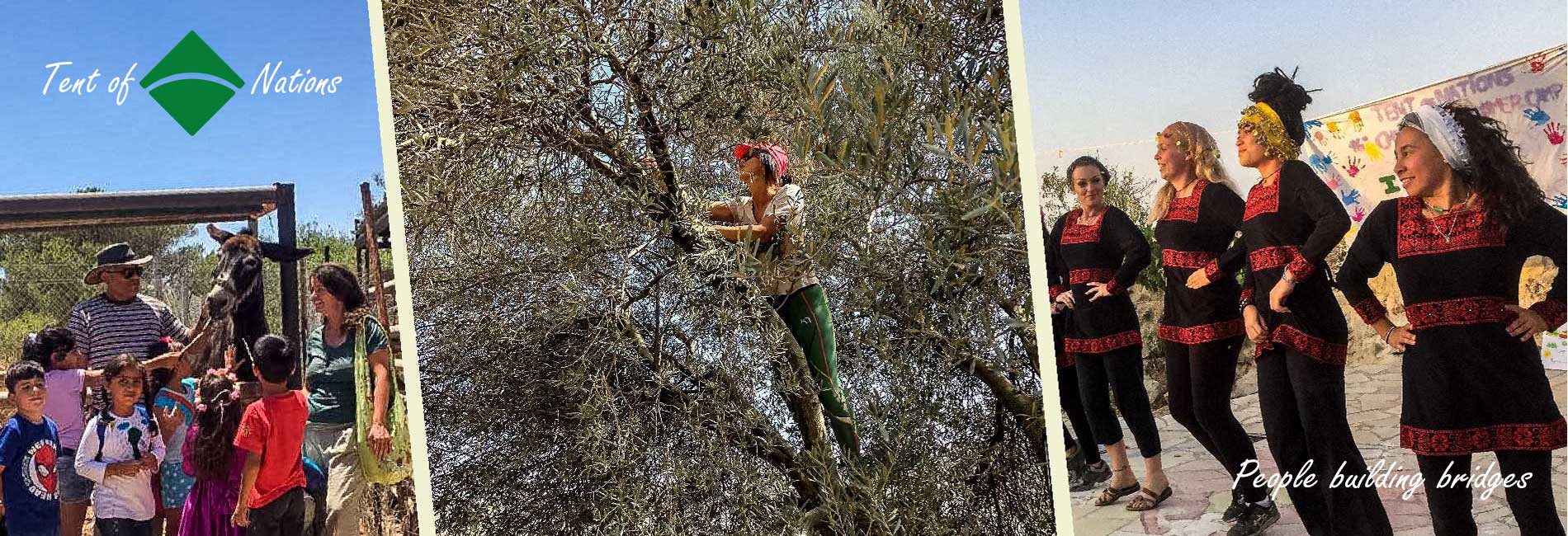History of the ToN
About Us: Rooted in the Land Since 1916
The Tent of Nations stands on a 100-acre (about 400 dunams) family farm named Daher’s Vineyard, located about six miles (about 10 km) southwest of Bethlehem in the West Bank. The land was purchased in 1916 by the Nassar family, and the family holds original registrations and deed documents dating from the Ottoman era, through the British Mandate (registration in 1924-25), and Jordanian administration.
Despite these registers, in 1991, the Israeli authorities declared the Nassar family farm (and surrounding lands) as “state land”. Since then, the family has engaged in protracted legal proceedings in the Israeli Military courts, the Appeals Committee, and the Israeli Supreme Court to re-register and protect their land.
The farm is surrounded on all sides by illegal, under international law, Israeli settlements, including those in the Gush Etzion settlement bloc, and has faced repeated settlement-road encroachments, bulldozing and burning of orchards, and access restrictions. In the Spring of 2024, the most recent outpost began with containers. Now, in the Fall of 2025, there are around five families in fully fitted homes, with continued construction of new builds taking place daily. This outpost is merely feet from the farm’s fence.
Since the Nassar family began the re-registration process for their land, the case has been repeatedly delayed and deferred by the Israeli authorities. In 2019, the family finally received confirmation that their application was complete, but progress stalled again. A meeting of the Israeli Registration Committee in February 2021 was meant to determine the next steps; since then, no official results have been released.
Between 2021 and early 2023, a series of hearings were scheduled and repeatedly postponed — from May 2021 through January 2023 — as the state’s representatives failed to appear or requested more time. The family’s attorney has filed multiple appeals to compel a decision, yet the case continues to cycle between committees and courts without resolution.
During these years of delay, the Tent of Nations has faced repeated attacks and destruction.
-
May 21, 2021: over 1,000 trees — including hundreds of olive trees — were burned.
-
June 9, 2021: military bulldozers entered the property and uprooted 50 olive trees.
-
January 2022: 50 mature trees were destroyed in another act of vandalism.
-
January 28, 2022: Two of the Nassar brothers were attacked and seriously injured by masked men.
- March 2024: Road cuts off 15 acres of ToN land.
- April 17, 2024: 75 apple trees destroyed & soil removed
- April 2024: Road cutting through ToN land
- August 2025: 12 houses built in the outpost
The total damages exceed €150,000. No one has been held accountable.
Meanwhile, movement to and from the farm has become severely restricted. What was once an easy fifteen-minute trip along Route 60 to Bethlehem or Hebron — where volunteers could travel freely — now takes forty minutes or more through the villages of Nahalin and Husan. Since the war, five military gates have been installed along this route, allowing entire Palestinian communities to be sealed off without warning. These closures, combined with flying checkpoints, new surveillance infrastructure, and illegal roads bulldozed across the family’s property, deepen the isolation of the Tent of Nations and the daily hardship of those who farm there.
Despite all of this, the Nassars continue their work with steadfast nonviolence and faith, living their message every day:
“We refuse to be enemies.”


Who We Are
Tent of Nations (ToN) is an educational and ecological family farm committed to nonviolent resistance, environmental stewardship, intercultural education, and connecting people with the land. It serves as a living model of nonviolent action and faith-based community building, within the context of Palestine and the world.
We host international visitors, volunteers, and local partners who come to learn, share, and participate in our work. Together, we transform despair into hope through environmental education, organic farming, empowerment programs for women and children, and global solidarity.
Our Mission
Our mission is to build bridges between people and between people and the land through creative resistance, education, and environmental stewardship. We strive to cultivate understanding, respect, and sustainability by working in harmony with the land and with one another.
We live by four guiding principles:
- We refuse to be victims
- We refuse to hate
- We act on our faith
- We believe in justice
These principles shape every act of cultivation, teaching, and welcome that happens on the farm encompassed by the slogan We Refuse to Be the Enemy.

Quick facts about Palestine:
Palestine is internationally recognized as a state entity by 138 UN member states (about 72%) and has held observer status at the United Nations since 2012. It includes the Gaza Strip (360 sq km; about 2.1 million Palestinians) and the West Bank, including East Jerusalem (about 2.7 million Palestinians, of whom over 300,000 live in East Jerusalem). Approximately 950,000 people live in all of Jerusalem (125 sq km).
More than 700,000 Israeli settlers now live in settlements across the West Bank and East Jerusalem. These settlements are considered illegal under international law and have been repeatedly condemned by the UN.
Since the 1995 Oslo Accords, the West Bank has been divided into three administrative zones:
-
Area A – under full Palestinian civil and security control.
-
Area B – under Palestinian civil administration but Israeli security control.
-
Area C – under full Israeli military and civil control, covering about 62% of the West Bank.
In Area C, Palestinians face near-total restrictions on development. Building permits, home repairs, or the installation of basic infrastructure, such as running water, electricity, or paved roads, are rarely approved. Many existing homes, schools, and farm structures, therefore, carry demolition orders. These policies limit community growth and directly affect Palestinian farmers, including those at the Tent of Nations, whose land lies within Area C.
Sources: Wikipedia articles West Bank, Palestine, Gaza Strip, Jewish settlement, etc. (9/9/22) and BpB
Our Vision
We envision the Tent of Nations as a beacon of hope and sustainability – a place where individuals and communities learn to live in harmony with the environment and each other.
We are working toward full self-sufficiency in food, water, and energy, and developing an Environmental Education Center where young people can explore organic farming, renewable energy, sustainability, and nonviolent community building.
Our dream is to prepare a new generation to take responsibility for their future, to love their land, and to nurture peace from the ground up.
Why It Matters
Surrounded by settlements, locked gates, and daily restrictions, the Tent of Nations stands as a testament to nonviolent resistance and creative perseverance.
Here, hope is not abstract; it is planted, watered, and harvested every day. Every tree planted and every visitor welcomed affirms the simple truth that love is stronger than fear and that peace must begin with how we live, even under occupation.
| At the Tent of Nations, we continue to cultivate the soil, plant seeds of hope, and believe that a better future can and must grow from the ground up. |
Visit, Volunteer, or Support
We welcome individuals and groups to visit, volunteer, and be part of this ongoing story of faith, love, and hope.
- Plan your visit
- Volunteer with us
- Support our work
